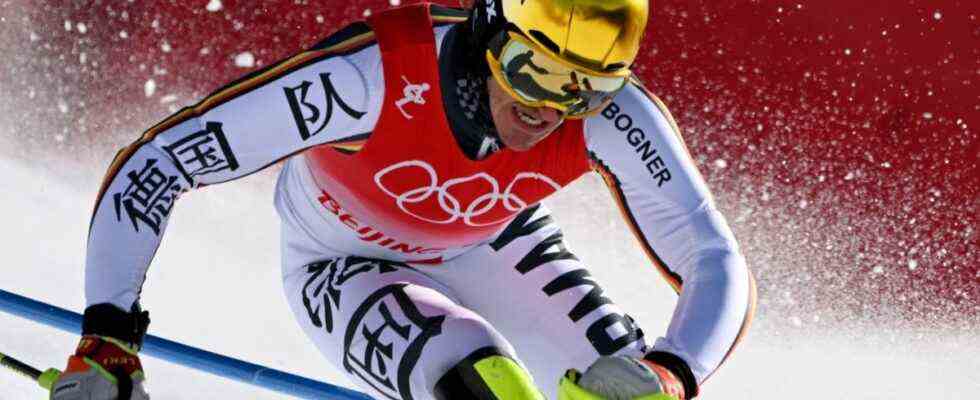Maybe it was the Prosecco dealer who didn’t make the trip to Beijing? A supervisor from the medical staff of the German ski racers, who deals in semi-sparkling wines as a part-time job, was in any case still in high demand in his role as a tasting expert when the German Alpines hit the World Championships in Cortina d’Ampezzo a year ago. Back then, Romed Baumann grabbed the silver medal in the men’s Super-G, and they spontaneously orchestrated a champagne reception in the hotel. All of this did not guarantee that the wax on the skis of the colleagues ran even more smoothly in the days that followed, but such a medal at the start also likes to wrap the colleagues in a blanket of well-being. A few races (and Prosecco drinks) later, Kira Weidle, Andreas Sander and the team in the parallel event had also entered the medal lists.
“A lot of people laughed beforehand,” said Wolfgang Maier at the time, the German Alpine board member, who, as always, had commissioned a few medals from his outsiders. “But sometimes,” he said, “it goes our way.” And now, on the Yanqing Olympic slopes?
13th place as the best result in the men’s downhill, seventh (Baumann) and eighth (Andreas Sander) in the Super-G, that was initially only conditionally suitable for Prosecco. And so it went on in almost all races. Simon Jocher and Alexander Schmid had no chance in combination and giant slalom. Lena Dürr’s fourth place in the slalom, 19 hundredths of a second behind the Olympic champion, “of course it broke morale for a moment,” said Maier now. “There are major events that are going on,” he added, “and some that are a bit slow.” That was before the women’s downhill and the men’s slalom, fourth place for Kira Weidle and seventh for Linus Straßer.
With pride and a crying eye: Linus Straßer had calculated a little more.
(Photo: Jorge Silva/Reuters)
Of course, the absence of the Prosecco specialist didn’t matter. Basically, what they had recently feared in the DSV had now come true. They had traveled to Beijing again with a selection that was “not necessarily worth a medal”, as Maier recently recapitulated. And like every selection in this role, you hope “for that one lucky punch, or that you really manage to get the maximum of your performance.” It was something like that in Cortina, only: the smaller and larger things that had condensed into a carpet of glittering moments at the time didn’t materialize this time, in different ways.
The speed drivers, as the DSV head coach Christian Schwaiger recently emphasized, always needed a longer run-up for their success, a lot of self-confidence from good results – they didn’t collect them as eagerly this winter as they did a year ago. And a driver who can land a long jump even with a short run-up, like the downhill Olympic champion Beat Feuz, is currently only on sick leave: Thomas Dreßen is only crawling towards the renewed comeback after the next knee operation. In the end, the colleagues sometimes wanted to force it a little too much, as Romed Baumann recently admitted, or had to carry the ballast of expectations that they had imposed on themselves after the Cortina World Cup. “We have to go over the books and catch up on the backlog that was lower last year,” said Maier now.
Sometimes even one of life’s best runs isn’t enough for a medal
Dürr and Weidle, on the other hand, did little wrong in Beijing. In the end, Weidle’s fault was that she hadn’t fully transferred her fluid training performance to the main performance of the race. And Dürr learned the hardest way that even one of the “best slaloms of your life” (Maier) is sometimes not rewarded with a medal. The young Emma Aicher, 18, also impressed with two meritorious runs in slalom and giant slalom; Alexander Schmid, on the other hand, dropped out early in the giant slalom with the best part-time. He doesn’t want to think about the borderline weather conditions either, says Maier: “We didn’t perform as we had imagined.”
And Strasser? In an extremely balanced field of competitors, he had basically moved as cleverly as in the previous races, of which he had even won the Beijing dress rehearsal: Now he bounced fluidly through the first run, free of the headless risk that he often used to have had cost better results. fifth place But this time there was no catch-up race in the second run. Strasser thought he made “one mistake too many”, 0.23 seconds were missing from the bronze place of the Norwegian Sebastian Foss-Solevaag. So he pulled away “with a crying eye”, said Straßer, but was “absolutely proud” of his “good performance”. He and his colleagues from the technical department still have a chance, in the team event on Saturday.
First meeting: Frenchman Clement Noel with his first gold medal.
(Photo: Jorge Silva/Reuters)
Until then, if you wanted to look for something connecting, you might find this: The last shot of mentality, with which the best in Yanqing seasoned their runs, the Germans usually did not have in their range. This attitude, which her alpine board member had recently outlined: “I’m burning down there, I don’t give a damn what’s going on there”. This coolness was demonstrated by others this time: Frenchman Clement Noel, who now, in the second run in Yanqing, apparently remembered that he is the fastest slalom skier in the field – and raced from sixth place to Olympic victory. Or the Austrian Johannes Strolz, who lost all squad privileges for a while before the season, still prepares his own skis to this day, and now leaves the games with two medals: gold in the combination and silver in the slalom, 34 years after his father Hubert in Calgary won gold and silver in combined and giant slalom.
“Totally crazy,” found Strolz. In any case: strongly suspicious of Prosecco.

